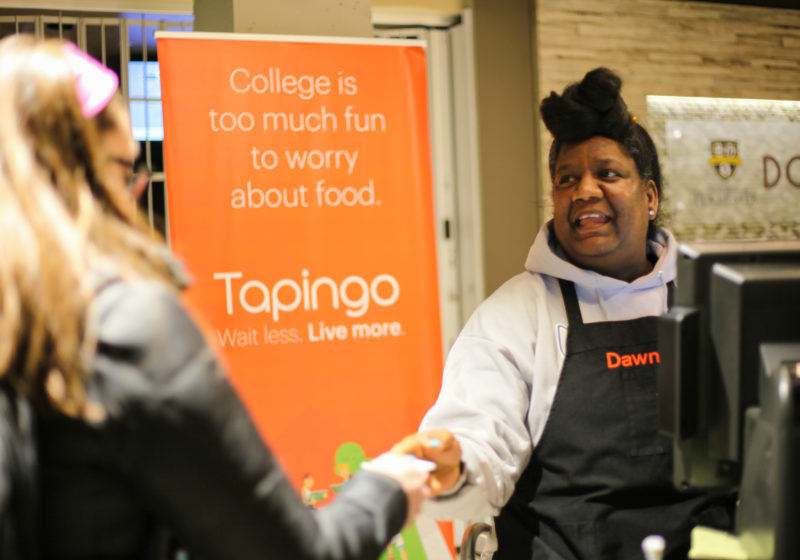Editor’s Note: This is part one of two articles about Dining Services workers.
It’s 12:20 p.m. Students stream into Douglass Dining Center hastily; discussions of modern poetry, physics examinations, and everyday drama fill the room. Life is busy and the social stimuli of the lunch break serves as a good distraction.
The students pause their conversations for a moment as they hand over their ID card to the smiling woman behind the register. She swipes the cards with precision and grace, arms swaying from left to right, from student to cash register, in perfect rhythmic motion.
Even her voice is aligned with the tempo in which she conducts the ebb and flow of students into the newly renovated Douglass Dining Center.
“Hey, baby. How are you doing today?”
It’s her signature refrain, with which she serenades each person who walks up to the register.
Occasionally, if a student chooses to engage, her simple chorus extends into a sweet ditty: “Oh, don’t worry honey. Only three more weeks until break. Hang in there, you’ve got this.”
This is the tune of Dawn Marshall-Hosier, one of the 16 Dining Services cashiers at the University. Out of the 186 employees within the department, cashiers are the most familiar to students. Unlike the cooks, who stand behind barriers of glass and a butcher block, cashiers sit unconcealed at the dining hall entrance, greeting students as they walk in. A simple transfer of a card is, for some students, the most personal connection made with Dining Services employees.
But despite Dawn’s recognizable dark brown freckles and tightly-bound top bun, most students would not be able to address her by name. It would take only a second to glance at the red embroidered letters upon her chest, but most eyes are locked on the bustling frenzy beyond the register.
When hiring cashiers, Dining Services seeks candidates who are outwardly enthusiastic. Cameron Schauf, director of Dining Services and auxiliary operations, goes by the motto, “hire the smile—you can teach everything else.”
It was those exact qualities that made Dawn and co-workers Leslie McKnight and Shamika Williams stick out.
Dawn and Leslie wound up working for Dining Services in a similar, though accidental manner. Dawn came to the department 23 years ago. At the time, she was working in one of the Medical Center’s research facilities. Having just given birth to her first child, the demanding hours required by the position were no longer feasible for her. Her supervisor recommended looking for positions on campus, as they only took place nine months out of the year.
As for Leslie, her sister recruited her as a University bus driver back in 2001. She transferred to Dining Services eight years later. Although she hasn’t been in the department as long as Dawn, Leslie is one of oldest cashiers; her silver speckled hair gives away her age despite the secrecy with which she keeps its exact number.
Shamika Wilson is the youngest of the three and the newest to the job. Arguably, she is also the busiest. At 34, she is a single mother of four, works 40 hours a week at the University and is a full-time student at Monroe Community College, where she studies graphic design. Shamika was drawn to the job 5 years ago when she realized she was unable to support her family with the wages she was receiving at Wegmans.
Beside the liveable wages Dining Service employees earn (after five years, most are making at least $15/hour), Dawn, Leslie, and Shamika rave about the benefits that come with the job. Health insurance is just one of them. Not only are hospital visits, checkups, and prescriptions covered, but the plan also includes dental and optical services. Overall, it’s a better deal per month than Dawn’s daughter gets at Blue Cross Blue Shield. Dawn also gets more sick days than her daughter.
“She only gets seven sick days a year,” says Dawn. “I’m like, girl, I’ve got 12!”
She breaks out her jazz hands in celebration.
Shamika, on the other hand, is using a training fund provided by her employment to help pay for her college education.
“My kids and I made a pact,” says Shamika. “If Mommy gets her college degree, so do they.”
And if Shamika’s children choose to attend the University, they would not have to pay full tuition due to the University’s Dependent Child Tuition Waiver. So far, her eldest son and daughter have no interest in attending UR; they have their eyes set on someplace warm, like the University of Florida. Shamika hopes her two younger kids will show more interest when the time comes.
“I pray all the time,” she laughs. “Like, please, save mommy some money!”



